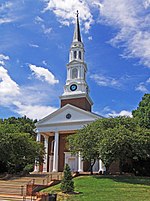SECU Stadium
1950 establishments in MarylandAmerican football venues in MarylandCollege lacrosse venues in the United StatesDefunct NCAA bowl game venuesLacrosse venues in Maryland ... and 8 more
Maryland Terrapins football venuesMaryland Terrapins lacrosseNCAA Division I men's lacrosse tournament venuesPhiladelphia/Baltimore Stars stadiumsSports venues completed in 1950United States Football League venuesUse American English from September 2019Use mdy dates from October 2022

SECU Stadium is an outdoor athletic stadium on the campus of the University of Maryland in College Park, Maryland. It is the home of Maryland Terrapins football and men's lacrosse teams, which compete in the Big Ten Conference. The facility was formerly named Byrd Stadium after Harry "Curley" Byrd, a multi-sport athlete, football coach, and university president in the first half of the 20th century, and temporarily Maryland Stadium after objections to Byrd's naming due to his history of supporting segregation.
Excerpt from the Wikipedia article SECU Stadium (License: CC BY-SA 3.0, Authors, Images).SECU Stadium
Branchville Road,
Geographical coordinates (GPS) Address Website Nearby Places Show on map
Geographical coordinates (GPS)
| Latitude | Longitude |
|---|---|
| N 38.990277777778 ° | E -76.947222222222 ° |
Address
University of Maryland, College Park (UMD)
Branchville Road
20742
Maryland, United States
Open on Google Maps







